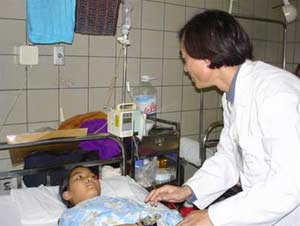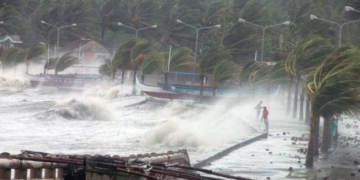With the hot weather, the number of children hospitalized due to viral fevers is continually increasing. Some children have recovered only to be readmitted for the same reason: a viral fever. Families are frantic, insisting on… intravenous fluids! But is this really necessary?
 |
|
Consider Before Administering IV Fluids to Children with Fever |
Dr. Nguyen Tien Dung, head of the pediatrics department at Bach Mai Hospital (Hanoi), explains that typically, when examining a child with a sudden fever lasting two to three days, if no bacterial infection is found, the initial conclusion will be a viral fever.
This method of differential diagnosis is about 90% accurate. It is important to note that a fever could also indicate diseases such as encephalitis, meningitis, or pneumonia, but the initial diagnosis remains a simple viral flu fever. Therefore, if a child has reduced fever for a few days and then has a fever again, further tests will be necessary to determine the underlying cause of the illness…
|
Common intravenous fluids include glucose solutions (5%, 10%), saline (saltwater with a sodium chloride ratio of 9/1,000), and multi-electrolyte solutions. According to Dr. Dung, administering 1 liter of 5% glucose means only about 50ml is absorbed into the body. In contrast, glucose can be more effectively absorbed through oral intake, such as lemon water or orange juice. In fact, children with viral fevers should only receive IV fluids if there is suspicion of dengue fever with accompanying skin manifestations, or if they have high fevers, continuous vomiting, cannot eat or drink, or have diarrhea leading to dehydration. |
Viruses are not living cells; they depend on the host’s cells to survive. When a virus invades, the body produces substances to eliminate the virus. Therefore, the fundamental principle for treating colds and fevers is to allow the child to rest, eat well, supplement with vitamin C, and administer paracetamol based on their weight. As the body’s immune system strengthens, the virus is expelled more quickly.
This is also why there is a misconception that administering fluids or water can instantly boost immunity and quickly reduce fever. “There is no scientific evidence for any medication that can enhance immunity in just a few days,” Dr. Dung asserts. There are cases where administering fluids seems to help reduce fever immediately, but this is merely coincidental; the fever subsides primarily due to the effects of antipyretic medications.
Fever in children is not simply caused by the flu virus; it can also be a symptom of other medical conditions, so caution is essential when deciding whether to administer IV fluids. For patients with encephalitis or meningitis, the choice of fluid is entirely different.
The principle is to avoid administering saline or sugar solutions, as these substances can increase intracranial pressure and worsen brain edema. For pneumonia patients, the criteria for administering fluids must be even stricter. The majority of pneumonia cases should not receive IV fluids because such fluids can place additional strain on the lungs and heart.
In cases of dehydration, oral rehydration is the best approach. If IV fluids are necessary, the doctor must carefully calculate the dosage; it cannot be done arbitrarily in a manner of “administer if you feel like it.”
NGỌC HÀ


















































